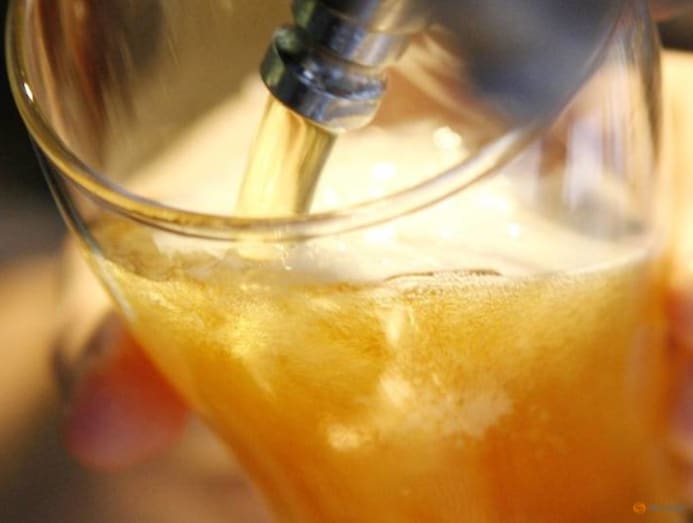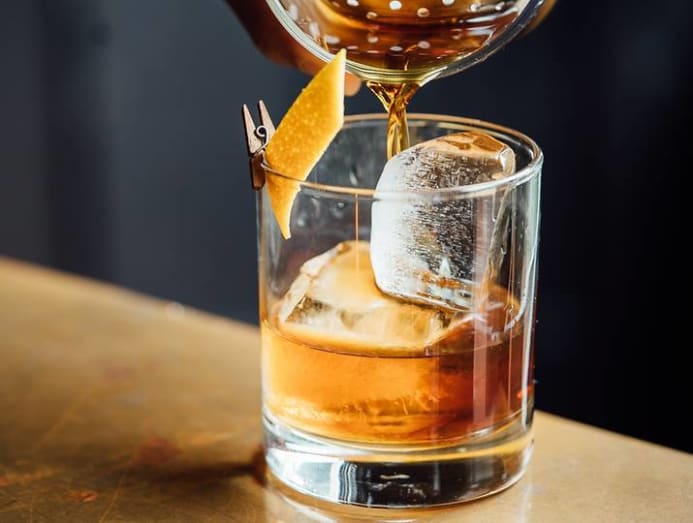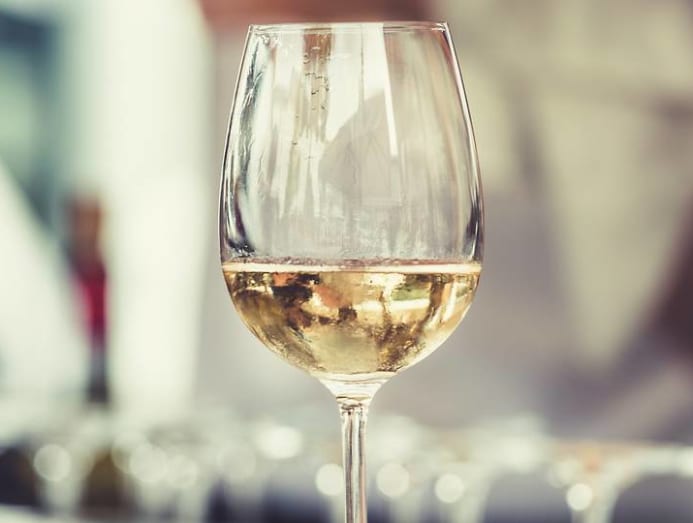Can you have alcohol after receiving the COVID-19 vaccine?
Later a long year and a lot of apprehension, getting the COVID-19 vaccine tin be cause for celebration, which for some, might mean pouring a beverage and toasting to their new amnesty. But can alcohol interfere with your immune response?
The short respond is: Information technology depends on how much you lot drink.
In that location is no bear witness that having a drink or ii tin return any of the current COVID-19 vaccines less effective. Some studies have even plant that over the longer term, small or moderate amounts of alcohol might actually benefit the immune organisation by reducing inflammation.
Heavy alcohol consumption, on the other manus, specially over the long term, can suppress the immune organisation and potentially interfere with your vaccine response, experts say.
READ: Does your face get cerise with alcohol? Hither'southward why you should leave 'Asian Flush' alone
Since it tin take weeks afterward a COVID-19 shot for the torso to generate protective levels of antibodies against the novel coronavirus, anything that interferes with the immune response would exist cause for business organization.
"If yous are truly a moderate drinker, then in that location'south no risk of having a drink around the time of your vaccine," said Ilhem Messaoudi, managing director of the Center for Virus Research at the Academy of California, who has conducted research on the furnishings of alcohol on the immune response.

"But be very cognisant of what moderate drinking actually means. It's dangerous to drink large amounts of alcohol because the effects on all biological systems, including the immune system, are pretty severe and they occur pretty rapidly after you get out of that moderate zone."
Moderate drinking is mostly defined equally no more than ii drinks a day for men and a maximum of one drink a twenty-four hour period for women, whereas heavy drinking is defined as four or more drinks on any day for men and three or more drinks for women.
Keep in mind that ane "standard" beverage in Singapore is defined as a can (330ml) of regular beer, one-half a glass (100ml) of wine or 1 nip (30ml) of spirit.
Heavy alcohol consumption impairs the immune response and increases your susceptibility to bacterial and viral infections.
Some of the commencement concerns about booze and COVID-19 vaccination began circulating after a Russian health official, who warned in Dec, that people should avoid booze for ii weeks before getting vaccinated and then abstain for another 42 days afterward.
According to a Reuters written report, the official claimed that alcohol could hamper the torso's ability to develop immunity against the novel coronavirus. Her alarm sparked a trigger-happy backlash in Russia, which has one of the earth'due south highest drinking rates.
READ: Will drinking alcohol and eating tofu increase the chance of getting breast cancer?
In the Usa, some experts say they have heard like concerns about whether it is safe to drink around the fourth dimension of vaccination.
"Nosotros've been getting a lot of questions from our patients nigh this," said Dr Angela Hewlett, an associate professor of infectious diseases, who directs the COVID-19 infectious diseases team at the University of Nebraska Medical Center.
"Understandably, people who are receiving these vaccines desire to make sure they're doing all the correct things to maximise their immune response."

Clinical trials of the COVID-19 vaccines that are currently approved for use by the US Nutrient and Drug Assistants did not specifically await at whether alcohol had any impact on the effectiveness of the vaccines, Hewlett said.
It'south possible that there volition be more information on that in the futurity.
Merely for now, about of what is known comes from previous enquiry, including studies that examined how alcohol affects the allowed system in humans and whether information technology hinders the allowed response in animals that received other vaccines.
READ: Now trending: Low and not-alcoholic drinks that give the kick without the hangover
Ane thing that is clear from studies is that heavy alcohol consumption impairs the immune response and increases your susceptibility to bacterial and viral infections.
It prevents immune cells from travelling to sites of infection and carrying out their duties, similar destroying viruses, bacteria and infected cells; makes it easier for pathogens to invade your cells, and causes a host of other problems.
In contrast, moderate drinking does non seem to accept this effect. In ane study, scientists exposed 391 people to five dissimilar respiratory viruses and plant that moderate drinkers were less likely to develop colds, but not if they were smokers.
In some other study, Messaoudi and colleagues provided rhesus monkeys admission to alcoholic beverages for 7 months and and so looked at how their bodies responded to a vaccine against poxvirus.
Much like humans, some rhesus monkeys enjoy alcohol and will drink a lot, while others show less interest and will limit themselves to small amounts.

The researchers found that the animals that were chronically heavy drinkers had a weak response to the vaccine. "They had about a nonexistent immune response," Messaoudi said.
The animals that consumed just moderate amounts of alcohol, however, generated the strongest response to the vaccine, even compared to the teetotalers that consumed no alcohol at all.
Studies in rats take establish a like pattern: Those consuming large amounts of alcohol take only a weak immune response to infections compared to animals given moderate amounts of alcohol or none at all.
Other studies take constitute that when people drink moderately, information technology seems to lower inflammatory markers in their claret.
READ: Should your cocktail conduct a cancer warning?
Another reason to moderate your booze intake is that heavy drinking – along with the hangover that can ensue – tin potentially amplify any side furnishings you might take from the COVID-xix vaccine, including fever, malaise or body aches, and make you feel worse, said Hewlett of the Academy of Nebraska Medical Center.
Hewlett chose non to drink after getting the COVID-xix vaccine. Only she said that people should feel free to imbibe so long as they potable within reason.
"Having a glass of champagne probably won't inhibit whatever immune response," she said. "I think having a celebratory beverage in moderation is fine."
By Anahad O'Connor © The New York Times
This article originally appeared in The New York Times.
https://www.nytimes.com/2021/04/27/well/eat/alcohol-covid-vaccine.html
Source: https://cnalifestyle.channelnewsasia.com/wellness/can-you-have-alcohol-after-receiving-covid-19-vaccine-237751
0 Response to "Can you have alcohol after receiving the COVID-19 vaccine?"
Post a Comment